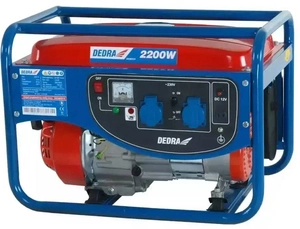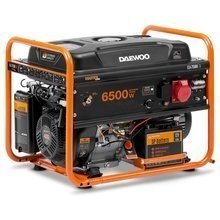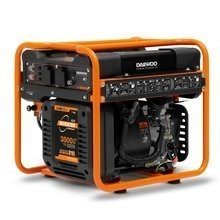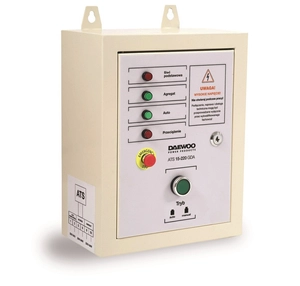Europe prepares for winter power outages

The current state of the electricity market is already affecting everyone. Electricity prices are rising, so we will have to dig much deeper into our pockets. And with Europe's shows, it could be even worse.
Although you probably don't need to paint the devil on the wall right away, it's always better to be prepared for the worst. At example w Austria in mid-November, they conducted the "Energy 21" exercise, which tested various scenarios for dealing with power outages . In Germany guidance on outages has been issued, specifically recommending the following initial supply of drinking water, food and warm blankets .
Although the energy situation in the Czech Republic remains stable, it is still good to be prepared. Much worse and even tragic is the situation in neighboring Poland. While overseas outages are expected mainly due to their absence due to the brash shutdown of non-environmental power plants prior to their replacement, we still encounter outages only due to planned short-term maintenance-related outages or in the event of icing. , when icing or falling trees break power lines.
Power shortages , Poland without electricity , Power cuts
A few decades ago, a power outage was not a big problem. We lit candles or kerosene lamps and poured them in the stove. Today, however, the situation is different. Power outages in winter mean heating problems in many homes.And this applies not only to those who have electric boilers, but also to those who have modern solid fuel boilers or gas boilers. They are electronically controlled and require a properly controlled electric pump drive to pump water to radiators or underfloor heating. They do not work without power, and if the pump fails and water stops circulating in the system, they may even be damaged. You may be out of luck, even if you have a fireplace or stove with a heat exchanger, because even that usually has a pump, so it is often impossible to heat in them without power without risk of damage.
Another problem can arise if you rely on water from your own well or borehole.In the case of wells, in the extreme case you can draw water with a bucket, as in the old days, but in the case of boreholes this option is not available. If we use an electric stove, we can't even cook. What are the possible solutions?
If you cook with electricity, it is a good idea to have a gas camping stove in stock. If you heat your home with an electric boiler or direct radiators, it would be foolish not to have in stock stove , fireplace insert or fireplace . For solid fuel boilers and gas boilers, it is necessary to provide a backup source of electricity. You can also use it as a backup power supply for a well or well pump.
What are the types and options of backup power supplies?
We will not deal here with photovoltaic systems, which have their own peculiarities and are a separate chapter. Most of the population still depends on one electricity supplier.
Currently, various battery backup sources , which can be beneficial especially in the case of short-term downtime. Their performance is limited and can therefore provide limited power for a maximum of a few hours . Once the batteries are discharged, there is no way to recharge them without power, so they are unusable after an extended power outage. From this point of view, they are still the best choice for generators with an internal combustion engine that can be refueled at any time and thus can operate virtually indefinitely. You can also charge the mentioned emergency power sources with them in emergency situations. Perhaps the only major drawback of the generator is that it is noisy, so it cannot be used, for example, in a block of flats, where it would disturb the neighbors on the balcony. Using a generator, we are practically limited only by its power and quite logically: the higher the power, the higher the fuel consumption. Therefore, it is definitely not suitable for powering an electric hob or oven. It would also be uneconomical to heat water in an electric boiler. It will always be better to use a spare gas camping stove here, despite possible limitations on the amount of hot water for personal hygiene.
However, power generator can be used mainly for power supply of pumps and electrical systems for boiler control. You can use them for charge spare batteries, phones, laptops, use them to power lights in the house. However, if you're wondering how it's worth it, believe that a generator is really only suitable as a backup source. An average 3.6 kW generator at full load consumes less than two liters of gasoline per hour, if it runs continuously for 24 hours, it will be correspondingly expensive to operate. However, in an emergency situation it is irreplaceable as a source of electricity for repeated, short-term use. In case of a longer break, it may be suitable np. to recharge spare batteries. If you have started to consider buying a generator, it would be good to know how to choose the most suitable one.
In most cases choose single-phase generator, three-phase generator makes sense only if you need to power a three-phase device, and today you will hardly find it in a normal household. If you choose, for example, a three-phase generator with a power output of 6000 watts, you have a maximum of one-third of the power, or 2000 watts, when connecting a single-phase device. Paradoxically, a single-phase generator of 3600 watts will power a single-phase device of much higher power (3600 watts). When choosing a generator, you should also consider the power consumption of the devices you plan to connect to it right away. Just add up their contributions and add a reserve of at least 10%, better yet 20%.
When choosing a generator, you may also wonder, what is the difference between an inverter generator and an AVR-controlled generator? In layman's terms, this is included in the price, as inverter panels are usually a bit more expensive. However, the difference is more significant and we will try to explain it to the layman:
In order not to damage the connected devices, it is necessary to ensure a stable and constant voltage at the output of the control panel. If several devices are connected to the control panel, voltage fluctuations may occur when switching them on and off, which may damage more sensitive devices. Therefore, the exchanges are equipped with voltage regulation to prevent these fluctuations. AVR control is a relatively simple and less expensive solution, but it is usually not as responsive and efficient as an inverter. The inverter's control panel also tends to operate a bit more efficiently, so it tends to wear less, especially if you are not currently using the full power of the plant. Therefore, the inverter control panel is suitable for powering even more sensitive electrical devices, which may be boiler controllers, laptops, etc. If you're not quite sure,
Author: PST
Recommended

HECHT GG950 UNITEDPOWER DC 12V 230V POWER GENERATOR 0.72kW 720W EWIMAX - OFFICIAL DISTRIBUTOR - AUTHORIZED HECHT DEALER

DEDRA DEGB2510 POWER GENERATOR WITH AVR DEDRA DEGB2510 POWER 2.2kW 2200W EWIMAX OFFICIAL DISTRIBUTOR - AUTHORIZED DEDRA DEALER

DEDRA DEGB3600K GENERATOR POWER GENERATOR with AVR 3.2kW 3200W EWIMAX OFFICIAL DISTRIBUTOR - AUTHORIZED DEALER DEDRA

DEDRA DEGB6500K GENGENATOR POWER PLANT with AVR 5.5kW 5500W EWIMAX OFFICIAL DISTRIBUTOR - AUTHORIZED DEALER DEDRA

DEDRA DEGB7503K GENERATOR GENERATOR with AVR POWER 6.5kW 6500W EWIMAX OFFICIAL DISTRIBUTOR - AUTHORIZED DEALER DEDRA

DAEWOO GDA 7500DPE-3 DUAL POWER GENERATOR DAEWOO GDA 7500DPE-3 DUAL POWER STARTER , 1x32A, 1x16A 380V AVR 6.5kW - OFFICIAL DAEWOO DISTRIBUTOR

DAEWOO GDA 8500E GENERATE GENERATOR WITH INTRODUCTOR 1x16A, 1x32A AVR POWER OF 7,5kW - OFFICIAL DISTRIBUTOR - AUTHORIZED DAEWOO DEALER

DAEWOO GDA 7500E-3 GENERATE GENERATOR WITH STARTER 1x16A 230V, 1x16A 380V POWER 6.5kW - OFFICIAL DISTRIBUTOR - AUTHORIZED DAEWOO DEALER

DAEWOO GDA 7500E GENERATE GENERATOR WITH INTRODUCTOR 1x16A, 1x32A POWER 6.5kW - OFFICIAL DISTRIBUTOR - AUTHORIZED DAEWOO DEALER

DAEWOO GDA 6500 POWER GENERATOR 1x16A, 1x32A AVR 5.5kW - OFFICIAL DISTRIBUTOR - AUTHORIZED DAEWOO DEALER

DAEWOO GDA 3500 GENERATOR 2x16A AVR 3,2kW POWER - OFFICIAL DISTRIBUTOR - AUTHORIZED DAEWOO DEALER

DAEWOO GDA 3500E GENGENATE GENERATOR WITH STARTER 2x16A AVR 3,2kW POWER - OFFICIAL DISTRIBUTOR - AUTHORIZED DAEWOO DEALER

DAEWOO GDA 8500E-3 GENERATE GENERATOR WITH STARTER 1x16A 230V, 1x16A 380V AVR POWER 7.5kW - OFFICIAL DISTRIBUTOR - AUTHORIZED DAEWOO DEALER

DAEWOO GDA 4600i INVERTOR GENERATOR 2x16A 3.5kW - OFFICIAL DISTRIBUTOR - AUTHORIZED DAEWOO DEALER

CEDRUS AG10E-3F GENERATOR AG10 AVR 3PHASE XXL 230V/400V 10 KW 10000W- OFFICIAL DISTRIBUTOR- AUTHORIZED DEALER CEDRUS

DAEWOO ATS 15-380GDA / ATS15-400GDA AUTOMATION MODULE SHR AUTOMATION FOR GENERATORS - OFFICIAL DISTRIBUTOR - AUTHORIZED DAEWOO DEALER

DAEWOO ATS 15-220GDA AUTOMATION MODULE SHR AUTOMATION FOR GENERATORS - OFFICIAL DISTRIBUTOR - AUTHORIZED DAEWOO DEALER

DAEWOO DDAE 6000XE DIESEL POWER GENERATOR 2x16A, 1x32A AVR 11HP POWER - OFFICIAL DISTRIBUTOR - DAEWOO AUTHORIZED DEALER

DAEWOO DDAE 6000XE-3 DIESEL POWER GENERATOR 2x16A 230V, 1x32A 380V AVR POWER 11KM - OFFICIAL DISTRIBUTOR - AUTHORIZED DAEWOO DEALER

DAEWOO DDAE 9000XE DIESEL POWER GENERATOR 2x16A, 1x32A AVR POWER 16HP - OFFICIAL DISTRIBUTOR - DAEWOO AUTHORIZED DEALER






